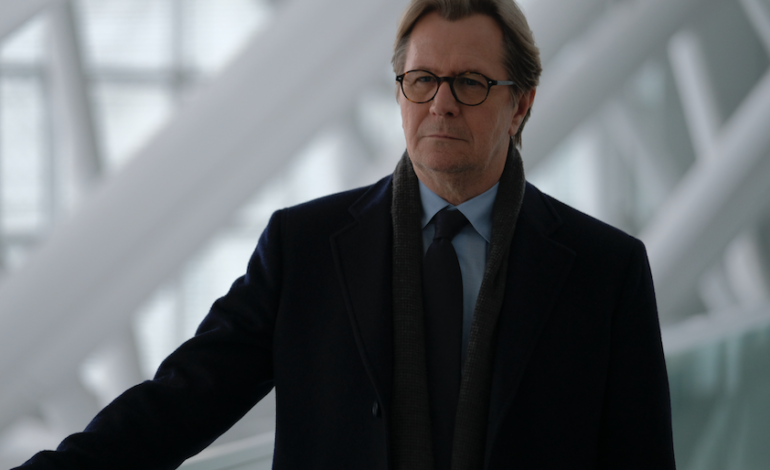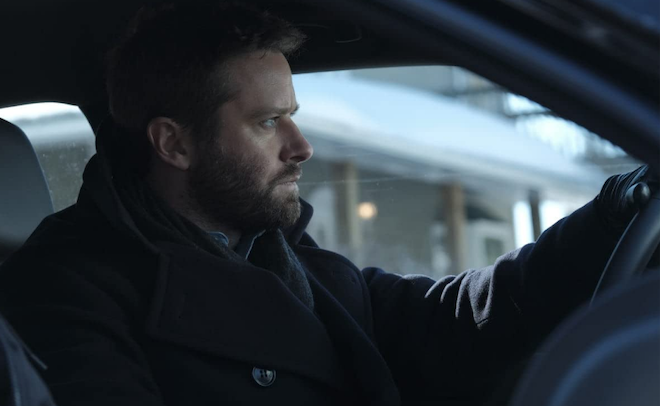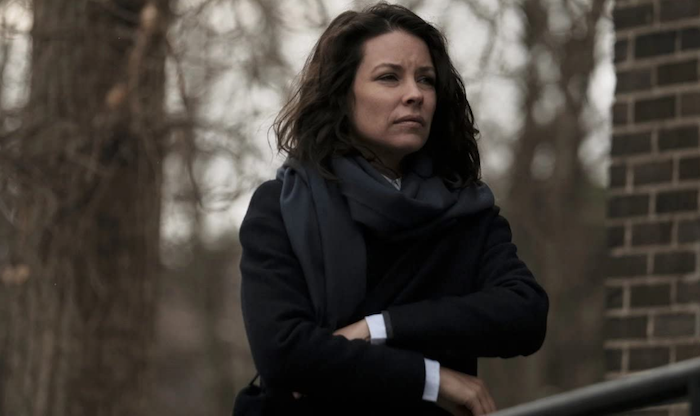

Written and directed by Nicholas Jarecki (Arbitrage, The Outsider, The Informers), Crisis (2021) follows a drug trafficker who arranges a multi-cartel Fentanyl smuggling operation, an architect recovering from an Oxycodone addiction searching for the truth behind her son’s disappearance, and a university professor battling unexpected revelations about his employer, a pharmaceutical company bringing a new “non-addictive” painkiller to market. Set against the backdrop of the opioid epidemic, their stories collide in this dramatic thriller.
The drug trafficker, Jake Kelly (played by Armie Hammer), is in actuality revealed to be an undercover cop who’s trying to take down this multi-cartel Fentanyl smuggling operation between the U.S. and Canada. Not only is he working undercover, risking his life to gain the trust of this drug operation to eventually take them down, but he also has the added burden of trying to help his drug-addicted sister Emmie Kelly (Lily-Rose Depp). His story coincides with that of Claire Reimann (Evangeline Lilly), a recovering addict who learns that her son had an accident involving opioids. In an effort to get justice for her son, she investigates the circumstances behind his involvement with drugs that ultimately leads her to go across the U.S.-Canada border and come face to face with the culprits. All the while, Dr. Tyrone Brower (Gary Oldman), a renowned university professor, is involved with researching and testing a new seemingly “non-addictive” painkiller to the market. With the drug about to be FDA approved, Brower makes some shocking discoveries not only about the drug but also about his research employer, a multi-million dollar drug company with deep government influence.
If it wasn’t clear from the synopsis, this film balances three separate characters on three seemingly separate journeys whose only commonality is that they all relate to the opioids crisis. Usually, that would be a pretty difficult thing to balance, but I actually think this movie handles those three separate plot lines very well. Most of that is mostly due to the editing from Duff Smith. He did a great job of switching from one character’s story to another. There was also a good amount of time spent on each story in the sense that we didn’t just spend 45 seconds with one character and then immediately switch to another in a way that makes the film confusing and jarring. Each scene is very well-paced and we get a good amount of time with each character and in each setting.


I have mixed feelings about Jarecki’s direction and writing. There were certain moments or sequences that were great and Jarecki would simply allow a moment to linger on a character, or he would create a very dynamic, intense scene with very high stakes. The best thing about the script is the delivery of exposition which was so fast-paced and ingrained into the scene that you wanted to pay attention because that’s what the story hinges on. I think it’s a combination of exposition and stakes. Jarecki does a great job of melding why what is being said matters and how/why it affects the characters. The best thing about the script was the plotting, exposition, and always finding opportunities to keep raising the stakes.
However, there was a bit of a downside to some of the pacing, which I’m entirely sure if it was due to the editing or to the writing. While, as I mentioned before, Jarecki is fantastic at writing plot and always keeping the plot moving, I think that at times that did serve as a bit of a detriment. Outside of Claire Reimann, whose storyline gets the most breathing room and gives her the most character development, it feels like the other two storylines barely get any breathing room. On the one hand, it keeps the film feeling very fast-paced and Jarecki handles exposition extremely well. On the other hand, I think that while the plot was well executed, the film, unfortunately, lacked a bit in character development, say again for Evangeline Lilly’s (Ant-Man, The Hobbit: The Desolation of Smaug, “Lost”) character. She has a great scene early on with her son that makes me wish we got more time to get to know him and his relationship with his mother. It’s also set up early on that Claire is a recovering addict, and there’s really only two other times where that comes up again, and only one of those times we actually see her struggling with her addiction and possibly relapsing. Again I think this was a missed opportunity to further explore her character and her struggles that were established at the beginning, as it ultimately feels like it was dropped after the first act until the very end.
As I mentioned, I had mixed feelings about Jarecki’s writing and direction. For the most part, I think he directed the action scenes really well. However, the more dialogue-heavy scenes, especially the ones Armie Hammer (The Social Network, Call Me by Your Name, The Lone Ranger) and Gary Oldman (Tinker Tailor Soldier Spy, Darkest Hour, Bram Stoker’s Dracula) were in did feel a bit stagnant. Most of them were quite engaging though, there were a few instances like this. Gary Oldman’s character for example in this one scene was standing a foot away from another character and they were just yelling at each other back and forth for what felt like 7 lines and it looked very stagnant and unnatural. But again, most of the direction was solid and fit the tone and mood of the scene. Most of the cinematography wasn’t that memorable, say for a few really cool-looking overhead aerial shots, but the whole film still looked nice.


I talked about Evangeline Lilly’s character before and failed yet to mention how great she was in the film. Gary Oldman was also great as a morally conflicted college professor. Similar to Claire, Oldman’s Tyrone is also a bit lackluster in the character department. On the one hand, Oldman’s performance really helped to elevate this character and some of the conflicts that the character comes across really up the stakes and get us to understand what’s important to him and why it’s so difficult for him to come forward with this information. However, there’s this really interesting bit of information that comes up later on in the film about his past that I wish gave us a bit more time to get to see his relationship with his wife as well as his relationship with his current students and how much he cares/loves his job. The acting all around was very strong. I think the weakest performance – at least of the main three characters – was Armie Hammer. It might be an issue of the direction I’m not sure, but it felt like this character only had one mood: angry. On top of that, this character was just kind of boring. The film kind of gives him motivation with his sister being addicted to the very drug he’s fighting against, but again their relationship is barely explored. He’s just a very gruff, angry undercover cop, and I found him to be a rather weak character who was only elevated by the more intense mob scenes.
Verdict: 3.5 out of 5 Stars
Crisis (2021) was well edited, benefited from great performances from Gary Oldman and Evangeline Lilly, and delivered on a high stakes plot with some well-delivered plot exposition and tension. With that being said, the film did lack some potentially promising character development and moments, some weak direction, and a somewhat unmemorable performance and character from one of the main protagonists. If you’re looking for a high stake, tension-fueled dramatic-thriller that looks at how we handle crises, though flawed, Nicholas Jarecki more than delivers.
